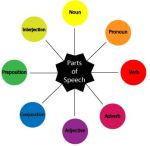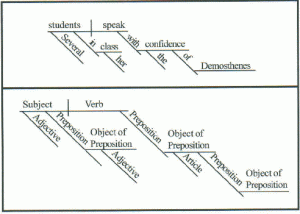The Clarity of Language
Words are so special!  Beautiful. Necessary…But they are often misused. Daily. Hourly. And minute by minute. We put them in the wrong places of sentences and the entire thought becomes muddled. We grab the wrong word and the meaning is not only wrong but often jokingly funny!
Beautiful. Necessary…But they are often misused. Daily. Hourly. And minute by minute. We put them in the wrong places of sentences and the entire thought becomes muddled. We grab the wrong word and the meaning is not only wrong but often jokingly funny!
I remember a preacher wanting to say “organism” and he ended up saying another sexually charged word…several times. The congregation was aghast, but he never caught his error!
As we think and translate between the languages of the world we learn that every language organizes words and sentence structure so uniquely different from another. If you are from a Spanish language country, you may think one way, and speak it a different way, but then I have to translate it into a sentence structure that makes sense for the audience. Where I may want to describe the car as “the red car”, Spanish often has it reversed, “the car red”. See. Language is so unique!
Maybe this is true of every language group, but I know the problem with English speakers is we seldom work on relearning or refreshing that knowledge we thought we had learned in those earlier years. Ask someone what is the difference between a verb or adverb, noun or pronoun, and the answer will not be clear. Never mind those other parts of the sentences like a preposition, conjunction, or adjective.
Often, it’s never easy to remember all the correct ways to connect words to have a complete and clear thought! Especially if we have to name the “little pieces parts.”
 I have written often about my poor experience of class in the 6th grade. For one year I was at one campus and with all the crowding of students, teachers were brought out of retirement to teach. I will name her, but those that were at DeZavala with me know the poorest 6th-grade teacher in the hallway. It was during this year that we learned how to diagram sentences. We had never done it before in earlier grades, so it never made clear sense to me. My cousin had a better class experience down the hallway and he seemed to grasp the concept very clearly!
I have written often about my poor experience of class in the 6th grade. For one year I was at one campus and with all the crowding of students, teachers were brought out of retirement to teach. I will name her, but those that were at DeZavala with me know the poorest 6th-grade teacher in the hallway. It was during this year that we learned how to diagram sentences. We had never done it before in earlier grades, so it never made clear sense to me. My cousin had a better class experience down the hallway and he seemed to grasp the concept very clearly!
Never mind thinking about all the tenses and levels of words we have to learn to make communication flow!
Through the years I’ve programmed in over 30 languages (COBOL, Fortran, Basic, RPG II, Assembler, C++, Visual Basic, etc…) and can often pick up a new language with ease because I know the “system” whether it be accounting or inventory (and one manager taught me this was more important to learn rather than the language – languages change and adapt, but the systems will always function the same basic way). Regardless, I’ve picked up, used and discarded so many languages I think I’m languaged out!
Since I find the language of the Bible to be so important, think a few minutes about the differences that exist in the translations between modern English and old English, and then go back further to Biblical Greek, Aramaic and Ancient Hebrew… Words and styles get added through the centuries! Buy my enquiring mind loves to dig through the ancient words and work on bringing them to a fresh audience with modern words that make sense today.
Of the many psalms that David wrote, there is one of my favorites and I’ve written about it several times. Psalms 37. It is didactic, meaning, it is intended to teach! Especially a lesson of moral values. Part of it is exhortation (emphatic urging). Part of it is calm, un-impassioned instruction.
It is clear. Understandable. And it makes great sense. At least in the English translation!
The one thing that pops out to me is the action words (verbs) that are continually used. See if you find them as you read the first few verses. Hint? I’ve made the words bold.
A Psalm of David. Do not fret because of evildoers, Nor be envious of the workers of iniquity. For they shall soon be cut down like the grass, And wither as the green herb. Trust in the LORD, and do good; Dwell in the land, and feed on His faithfulness. Delight yourself also in the LORD, And He shall give you the desires of your heart. Commit your way to the LORD, Trust also in Him, And He shall bring it to pass. He shall bring forth your righteousness as the light, And your justice as the noonday. Rest in the LORD, and wait patiently for Him; Do not fret because of him who prospers in his way, Because of the man who brings wicked schemes to pass. Cease from anger, and forsake wrath; Do not fret—it only causes harm. (Psalms 37:1-8 NKJV)
Then he references a scripture we use often as we document our lives…
The steps of a good man are ordered by the LORD, And He delights in his way. (Psalms 37:23 NKJV)
The order we need to follow are those verbs I highlighted above. No fretting or envying, rather Trust, Dwell, Delight, Commit, Rest, Wait, Cease, Forsake… All action words on how to actively live.
The book of Psalms contains 150 chapters. Not really chapters, but each is a stand-alone song or poem, essentially a book that can stand alone without all the other books. Though many are related to a point of history, each “chapter” is a standalone story.
In Psalms 1, we think that this first chapter may have been a preface to the entire book. Think about it…
Blessed is the man
Who walks not in the counsel of the ungodly,
Nor stands in the path of sinners,
Nor sits in the seat of the scornful;
But his delight is in the law of the LORD,
And in His law he meditates day and night.
He shall be like a tree Planted by the rivers of water,
That brings forth its fruit in its season,
Whose leaf also shall not wither;
And whatever he does shall prosper.
The ungodly are not so,
But are like the chaff which the wind drives away.
Therefore the ungodly shall not stand in the judgment,
Nor sinners in the congregation of the righteous.
For the LORD knows the way of the righteous,
But the way of the ungodly shall perish.
(Psalms 1:1-6 NKJV)
Valid words. Beautiful thoughts. Words to live by, and to gauge your actions by. Necessary. Even today. It lays out the beauty of a relationship between God and man and sets the stage for all the other books (chapters) in Psalms.
What are your favorite words? Which language do you like them best in?

